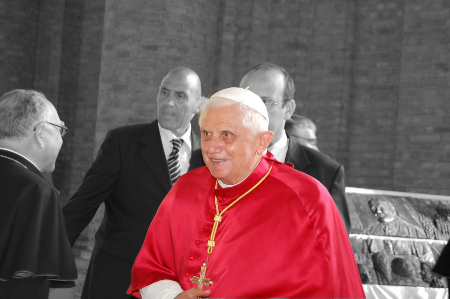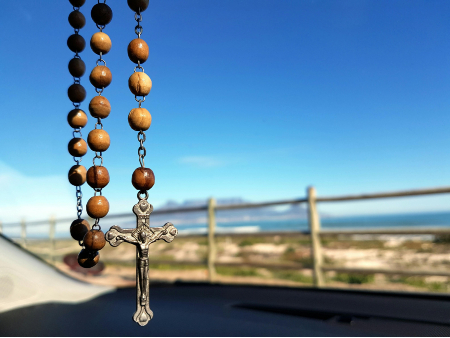Papal Address to Conference on Genome
FREE Catholic Classes
"Human Dignity Can't Be Identified With Genes"
VATICAN CITY, DEC. 16, 2005 (Zenit) - Here is the address Benedict XVI gave Nov. 19 to the participants at the international conference organized by the Pontifical Council for Health Care Workers on the theme of the human genome.
* * *
Your Eminence,
Venerable Brothers in the Episcopate and in the Priesthood,
Distinguished Ladies and Gentlemen,
I address my cordial greeting to you all, with a special thought of gratitude to Cardinal Javier Lozano Barragán for the kind greeting he has expressed on behalf of those present.
I offer a special greeting to the bishops and priests who are taking part in this conference as well as the speakers, who have certainly made a highly qualified contribution to the problems addressed in these days: Their reflections and suggestions will be the subject of an attentive evaluation by the competent ecclesial bodies.
Placing myself in the pastoral perspective proper to the pontifical council that has sponsored this conference, I would like to point out that today, especially in the area of breakthroughs in medical science, the Church is being given a further possibility of carrying out the precious task of enlightening consciences, in order to ensure that every new scientific discovery will serve the integral good of the person, with constant respect for his or her dignity.
We ask you, humbly: don't scroll away.
Hi readers, it seems you use Catholic Online a lot; that's great! It's a little awkward to ask, but we need your help. If you have already donated, we sincerely thank you. We're not salespeople, but we depend on donations averaging $14.76 and fewer than 1% of readers give. If you donate just $5.00, the price of your coffee, Catholic Online School could keep thriving. Thank you.Help Now >
In underlining the importance of this pastoral task, I would like first of all to say a word of encouragement to those in charge of promoting it.
The contemporary world is marked by the process of secularization. Through complex cultural and social events, it has not only claimed a just autonomy for science and the organization of society, but has all too often also obliterated the link between temporal realities and their Creator, even to the point of neglecting to safeguard the transcendent dignity of human beings and respect for human life itself.
Today, however, secularization in the form of radical secularism no longer satisfies the more aware and alert minds. This means that possible and perhaps new spaces are opening up for a profitable dialogue with society and not only with the faithful, especially on important themes such as those relating to life.
This is possible because, in peoples with a long Christian tradition, there are still seeds of humanism which the disputes of nihilistic philosophy have not yet reached. Indeed, these seeds tend to germinate more vigorously, the more serious the challenges become.
Believers, moreover, know well that the Gospel is in an intrinsic harmony with the values engraved in human nature. Thus, God's image is deeply impressed in the soul of the human being, the voice of whose conscience it is far from easy to silence.
With the Parable of the Sower, Jesus in the Gospel reminds us that there is always good ground on which the seed may fall, spring up and bear fruit. Even people who no longer claim to be members of the Church or even those who have lost the light of faith, nonetheless remain attentive to the human values and positive contributions that the Gospel can make to the good of the individual and of society.
It is particularly easy to become aware of this by reflecting on the topic of your conference: The people of our time, whose sensitivity, moreover, has been heightened by the terrible events that have clouded the 20th century and the beginning of the 21st, easily understand that human dignity cannot be identified with the genes of the human being's DNA and is not diminished by the possible presence of physical differences or genetic defects.
The principle of "non-discrimination" on the basis of physical or genetic factors has deeply penetrated consciences and is formally spelled out in the charters of human rights. The truest foundation of this principle lies in the dignity inherent in every human person because he or she is created in the image and likeness of God (cf. Genesis 1:26).
What is more, a serene analysis of scientific data leads to a recognition of the presence of this dignity in every phase of human life, starting from the very moment of conception. The Church proclaims and proposes this truth not only with the authority of the Gospel, but also with the power that derives from reason. This is precisely why she feels duty bound to appeal to every person of good will in the certainty that the acceptance of these truths cannot but benefit individuals and society.
Indeed, it is necessary to preserve ourselves from the risks of a science and technology that claim total autonomy from the moral norms inscribed in the nature of the human being.
There are many professional bodies and academies in the Church that are qualified to evaluate innovations in the scientific environment, particularly in the world of biomedicine; then there are doctrinal bodies specifically designated to define the moral values to be safeguarded and to formulate norms required for their effective protection; lastly, there are pastoral dicasteries, such as the Pontifical Council for Health Pastoral Care, whose task is to ensure that the Church's pastoral presence is effective.
This third task is not only invaluable with regard to an ever more adequate humanization of medicine, but also in order to guarantee a prompt response to the expectations by each individual of effective spiritual assistance.
Consequently, it is necessary to give pastoral health care a new impetus. This implies renewal and the deepening of the pastoral proposal itself. It should take into account the growing mass of knowledge spread by the media and the higher standard of education of those they target.
We cannot ignore the fact that more and more frequently, not only legislators but citizens too are called to express their thoughts on problems that can be described as scientific and difficult. If they lack an adequate education, indeed, if their consciences are inadequately formed, false values or deviant information can easily prevail in the guidance of public opinion.
Updating the training of pastors and educators to enable them to take on their own responsibilities in conformity with their faith, and at the same time in a respectful and loyal dialogue with nonbelievers, is the indispensable task of any up-to-date pastoral health care. Today, especially in the field of the applications of genetics, families can lack adequate information and have difficulty in preserving the moral autonomy they need to stay faithful to their own life choices.
In this sector, therefore, a deeper and more enlightened formation of consciences is necessary. Today's scientific discoveries affect family life, involving families in unexpected and sensitive decisions that require responsible treatment. Pastoral work in the field of health care thus needs properly trained and competent advisers.
This gives some idea of the complex and demanding management needed in this area today.
In the face of these growing needs in pastoral care, as the Church continues to trust in the light of the Gospel and the power of grace, she urges those responsible to study a proper methodology in order to help individuals, families and society, combining faithfulness and dialogue, theological study and the ability for mediation.
In this, she sets great store especially by the contribution of all, such as you who are gathered here to take part in this international conference and who have at heart the fundamental values that support human coexistence. I gladly take this opportunity to express to you all my grateful appreciation for your contribution in a sector so important for the future of humanity.
With these sentiments, I invoke from the Lord an abundance of enlightenment on your work, and as a testimony of my esteem and affection, I impart a special blessing to you all.
[Translation distributed by the Holy See]
Contact
The Vatican
https://www.catholic.org
, VA
Pope Benedict XVI - Bishop of Rome, 661 869-1000
info@yourcatholicvoice.org
Keywords
Pope, Benedict, Genome, Human, Dignity, Genes
More Catholic PRWire
Showing 1 - 50 of 4,716
A Recession Antidote
Randy Hain
Monaco & The Vatican: Monaco's Grace Kelly Exhibit to Rome--A Review of Monegasque-Holy See Diplomatic History
Dna. Maria St. Catherine Sharpe, t.o.s.m., T.O.SS.T.
The Why of Jesus' Death: A Pauline Perspective
Jerom Paul
A Royal Betrayal: Catholic Monaco Liberalizes Abortion
Dna. Maria St.Catherine De Grace Sharpe, t.o.s.m., T.O.SS.T.
Embrace every moment as sacred time
Mary Regina Morrell
My Dad
JoMarie Grinkiewicz
Letting go is simple wisdom with divine potential
Mary Regina Morrell
Father Lombardi's Address on Catholic Media
Catholic Online
Pope's Words to Pontifical Latin American College
Catholic Online
Prelate: Genetics Needs a Conscience
Catholic Online
State Aid for Catholic Schools: Help or Hindrance?
Catholic Online
Scorsese Planning Movie on Japanese Martyrs
Catholic Online
2 Nuns Kidnapped in Kenya Set Free
Catholic Online
Holy See-Israel Negotiation Moves Forward
Catholic Online
Franchising to Evangelize
Catholic Online
Catholics Decry Anti-Christianity in Israel
Catholic Online
Pope and Gordon Brown Meet About Development Aid
Catholic Online
Pontiff Backs Latin America's Continental Mission
Catholic Online
Cardinal Warns Against Anti-Catholic Education
Catholic Online
Full Circle
Robert Gieb
Three words to a deeper faith
Paul Sposite
Relections for Lent 2009
chris anthony
Wisdom lies beyond the surface of life
Mary Regina Morrell
World Food Program Director on Lent
Catholic Online
Moral Clarity
DAN SHEA
Pope's Lenten Message for 2009
Catholic Online
A Prayer for Monaco: Remembering the Faith Legacy of Prince Rainier III & Princess Grace and Contemplating the Moral Challenges of Prince Albert II
Dna. Maria St. Catherine Sharpe
Keeping a Lid on Permissiveness
Sally Connolly
Glimpse of Me
Sarah Reinhard
The 3 stages of life
Michele Szekely
Sex and the Married Woman
Cheryl Dickow
A Catholic Woman Returns to the Church
Cheryl Dickow
Modernity & Morality
Dan Shea
Just a Minute
Sarah Reinhard
Catholic identity ... triumphant reemergence!
Hugh McNichol
Edging God Out
Paul Sposite
Burying a St. Joseph Statue
Cheryl Dickow
George Bush Speaks on Papal Visit
Catholic Online
Sometimes moving forward means moving the canoe
Mary Regina Morrell
Action Changes Things: Teaching our Kids about Community Service
Lisa Hendey
Easter... A Way of Life
Paul Spoisite
Papal initiative...peace and harmony!
Hugh McNichol
Proclaim the mysteries of the Resurrection!
Hugh McNichol
Jerusalem Patriarch's Easter Message
Catholic Online
Good Friday Sermon of Father Cantalamessa
Catholic Online
Papal Address at the End of the Way of the Cross
Catholic Online
Cardinal Zen's Meditations for Via Crucis
Catholic Online
Interview With Vatican Aide on Jewish-Catholic Relations
Catholic Online
Pope Benedict XVI On the Easter Triduum
Catholic Online
Holy Saturday...anticipation!
Hugh McNichol












 Daily Readings for Wednesday, April 17, 2024
Daily Readings for Wednesday, April 17, 2024 St. Anicetus: Saint of the Day for Wednesday, April 17, 2024
St. Anicetus: Saint of the Day for Wednesday, April 17, 2024 Prayer to Love God above all Things: Prayer of the Day for Wednesday, April 17, 2024
Prayer to Love God above all Things: Prayer of the Day for Wednesday, April 17, 2024


